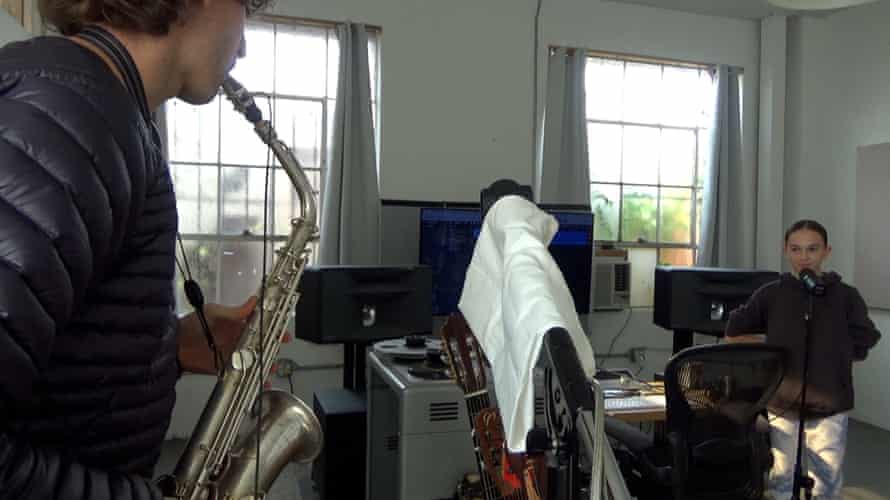Sam Gendel and Antonia Cytrynowicz are two of experimental pop music’s most unlikely creative partners. Gendel, 35, is the Los Angeles saxophonist who has lent his talents to records by Vampire Weekend, Maggie Rogers and Perfume Genius, all while maintaining a prolific solo practice that’s among the most appealingly unpredictable in modern jazz. Cytrynowicz is a classic multi-hyphenate – a singer-songwriter who produces her own tracks on GarageBand, dancer, visual artist and actor who’s also a fan of classic 70s rock bands like Rush and Bread. She’s also 12.
In reality, the pair are a natural fit. They’ve known each other for a while now – Cytrynowicz is the younger sister of Gendel’s partner, Marcella. Their debut album together, Live a Little, is the product of a little under an hour’s worth of recording at Gendel’s studio, Cytrynowicz conjuring melodies and lyrics in the moment as Gendel played saxophone, guitar and a few other instruments: the resulting record sounds a little like if FKA twigs tried to reinterpret long-lost jazz standards. “We got to do that really vulnerable, intimate thing of improvising together,” Gendel recalls. He shaped the recordings as lightly as possible, “trying to keep the spirit of what it was intact, all the way to the end.”
Zooming from a sparse white kitchen in Los Angeles, Gendel and Cytrynowicz are a comically proportioned pair – him tall and lanky, his calm gesticulations in contrast to the almost cosmic metaphors he uses to describe music; her, diminutive, shy and a little mischievous-seeming. As Cytrynowicz describes why she likes Gendel’s music – “I like that it’s very chill, it’s very visual, you picture things in your mind when you listen to it” – and her own writing process, he looks on admiringly. Cytrynowicz credits her musician sister with inspiring her to make music. She used to write lyrics in her notebook and record them into GarageBand, a process that she says she finds difficult now. “I think about it too much and I race. I just don’t like it any more – I prefer to improvise.”
Live a Little is remarkable not because it was made by a kid, but because it’s so good – warm and mercurial, there’s an intense mystery to Cytrynowicz’s lyrics which unfold with the cadence of a dream: “Sometimes I feel like / Running up a hill / Not knowing what is there / But just thinking …”
The pair didn’t exchange ideas before recording, other than Cytrynowicz noting that she “wanted the overall mood to be melancholic,” Gendel recalls. But they didn’t really need to – Gendel is a seasoned collaborator known for work with artists like oddball bassist Sam Wilkes and indie producer Blake Mills, and found that Cytrynowicz was as keyed in as any of those seasoned pros. “Her playfulness is infectious for someone like me,” he says, “who just always wants to be playing in whatever way with any idea.”
“Infectious playfulness” has been a constant of Gendel’s career. He began playing saxophone in the school band, and was introduced to the music of avant garde jazz legends like Rahsaan Roland Kirk by his parents. After studying jazz at the University of Southern California, he fell in with a crowd of innovative, casually adventurous young musicians, among them Wilkes and drummer Louis Cole.
In 2017, Gendel began releasing music under his own name, and, since then, new projects have come thick and fast: 2018’s Wilkes collaboration Music for Saxofone & Bass Guitar, and its 2021 sequel, Music for Saxofone & Bass Guitar More Songs; 2020’s reinterpreted standards album Satin Doll, and the saxophone-free, almost-R&B record DRM; and, most notably, last year’s Fresh Bread, a 52-song album of beats, sketches, and vibe pieces that – almost – encompasses everything Gendel does. It’s the most exciting, immersive project of his career, and a nightmare to slot into a modern musical landscape. Does he ever feel the need to taxonomise his work into jazz songs, rap songs, R&B songs, and so on?
“The jazz thing – I don’t even know how to speak to that any more,” he says, sounding exasperated. “People use ‘jazz’ just in the weirdest way, that I just can’t relate.” He describes his approach to releasing music as “kind of a spring … kind of how nature operates”. He acknowledges his debt to the history of jazz, but concludes: “I don’t know what I do.”
A collaborator like Cytrynowicz, then, who works with what Gendel says is an uncommonly free-ranging sense of creativity, is perfect for someone looking to elude categorisation. “She’s just not in any box at all, there’s just not a box,” he says. Throughout our conversation, he describes the recording of Live a Little as something totally synergistic – the kind of thing where, in an instant, they were “just buzzing”.
You can feel their unique chemistry and drive for pure creativity in the finished product. It’s a testament to the wit and ease with which both artists make music – a refreshingly nonlinear approach that’s about just taking an idea and putting it into the world without fanfare or fuss. Gendel sums it up neatly: “I’m really just trying to have fun and take the ideas that come and make them real, as much as possible.”

